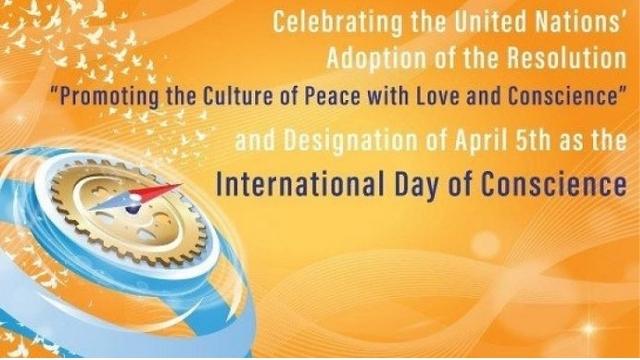The role of Dr. Hong and Tai Ji Men in promoting the International Day of Conscience—and the lack of conscience of their persecutors.
by Marco Respinti*
*A paper presented as the introduction of the webinar “A Question of Conscience: The Tai Ji Men Case,” co-organized by CESNUR and Human Rights Without Frontiers on April 5, 2022, International Day of Conscience.

Today, April 5, 2022, is the International Day of Conscience, actually the third International Day of Conscience celebrated by the United Nations. In fact, this special day of observance was established by the United Nations General Assembly on July 25, 2019, with the adoption of U.N. resolution 73/329. The first International Day of Conscience was celebrated on April 5, 2020. The decision taken by the U.N. has an important story.
We are all familiar with the United Nations’ Universal Declaration of Human Rights, adopted on December 10, 1948. This document establishes a shared standard in recognizing and acknowledging the dignity of every human being living in the world—past, present and future. Of course, we know that many countries and many regimes do not respect, did not respect, and sadly will probably not respect, nor even formally recognize, in the future, the Universal Declaration of Human Rights. Some pay only a lip service to it; others blatantly deny its core values. Nonetheless, every civilized, cultured, and good-hearted human being does uphold the Declaration with no hesitation.
None of us is so superficial to believe that human rights started to exist when a written document put them on paper. Human rights pre-date the U.N. Universal Declaration of Human Rights. Yes, we have touched this subject several times during our long series of webinars on the Tai Ji Men case but allow me a brief reminder. The basic and only rationale for human rights is human nature. Human beings enjoy rights, or have certain specific rights, because they are human. No one can curtail or deny those human rights because this would be tantamount to assaulting human nature, something we should all consider impermissible and even unthinkable.
If human rights already existed, the very idea of including them into a solemn declaration, and claiming that such a document was needed, may seem odd to some. It is not. One of the most common and sad sins we repeatedly see committed by human beings is forgetfulness. Humans tend easily to forget, either involuntarily or by guilt.
A document such as the U.N. Universal Declaration of Human Rights is not the source of human rights, but, as all constitutions do, serves to combat the human bad habit of forgetfulness. Bringing countries and nations and governments to publicly recognize the Universal Declaration of Human Rights means bringing them to kneel in front of that intangible miracle which is human dignity, and there is never too much of this.
We cannot speak of human rights without centering our attention on conscience, one among a few distinctive features that make humans human‒and humane.
The word “conscience” comes from the Latin “conscientia,” and it means “knowing oneself.” It is the first, pivotal stage of knowledge from which all science (scientia) depends. Conscience is in fact a very intimate mode of knowledge. It appears when humans become aware of three basic elements: first, themselves; second, a reality outside of them and distinct from themselves; and third, a mysterious origin of both themselves and the surroundings reality. At some stage, we all realize that no human being can ultimately create neither the intimate conscience of a person, or self, nor the surrounding reality.
This is where religion, and religious liberty as a consequence, enter the picture. In fact, peoples throughout history have consistently identified that mysterious origin as God, a Superior Being, or a Supreme Spiritual Entity. Throughout all human history, that is, with the exception of the last two or three centuries, when atheism emerged. This period of time is just a small dot along the great walk of humanity on Earth. Even this exception is partial, and mostly concentrated in the West. Even there, in the modern West, the prevalence of atheism should not be exaggerated, as scholars of religions and those who observe new religious movements in the so-called post-modern world may document.

I started from the International Day of Conscience, but in fact today I began with the Universal Declaration of Human Rights, because the day we are celebrating starts exactly from that document. In 2018, His Royal Highness the Prime Minister of Bahrain Prince Khalifa bin Salman al-Khalifa also started from there. He insisted upon the world leaders in the United Nations to strongly endorse the principles written and recognized in the Declaration.
This implied that those principles had not been endorsed as they deserved until that moment. So, the Prime Minister of Bahrain submitted a draft where he stated that ignoring human conscience ultimately means doing harm to human beings. His proposal was finally accepted, and the U.N. General Assembly established April 5 as the International Day of Conscience.
However, few people know that Tai Ji Men had a great role in that decision.
Tai Ji Men founder and shifu, Dr. Hong, Tao-Tze, has accomplished many important goals through the Federation of World Peace and Love, or FOWPAL, which he established in the United States in the year 2000 to actively promote love and peace on Earth. Today, FOWPAL counts members in 137 countries.
In 2014, FOWPAL launched the Movement of An Era of Conscience, and from 2018 collaborated with the Permanent Missions to the United Nations of Bahrain (and other countries) to draft the very document the U.N. eventually adopted, thus giving birth to the International Day of Conscience.
Tai Ji Men is at the core of the International Day of Conscience, acting as the conscience of the world movement for peace and love. In other words, the International Day of Conscience perhaps would not even exist without FOWPAL, Tai Ji Men, and Dr. Hong, and the International Day of Conscience is really a part of Tai Ji Men heritage.
Now, how is it possible that the world which applauds and endorses the U.N. Universal Declaration of Human Rights, the world that recognizes human dignity and human rights even before a written document is drafted, the world that established an International Day of Conscience to actively and practically implement that document—how is it possible that this world can tolerate a quarter of a century of unjust persecution against Tai Ji Men, with its whole burden of false accusations of imaginary crimes?
As you may know, I am a Roman Catholic. In the “Catechism of the Catholic Church,” published in its final form in 1997, it is said that conscience is the echo of the Word of God in human beings (no. 912). It is indeed a noble, highest feature of humans, but it is not infallible, because only God is infallible. God’s echo as perceived by humans is not infallible, because human perception is not infallible.
There is only one way, the Catechism continues, to assure infallibility to human conscience, and it is by anchoring conscience on truth. The entire human person, the Catholic Catechism says, is implied in this search for truth, because truth can never refer to one part of the human being only.
The word “truth” resounded high many times during our series of webinars on the staggering Tai Ji Men case. May this third International Day of Conscience be the last one seeing Tai Ji Men’s shifu and dizi stripped off their dignity, so that truth can prevail at last. All those who deal with the Tai Ji Men case have just to look deeply into their own conscience to find there the Truth, as an echo of the Divine.
Source: Bitter Winter

